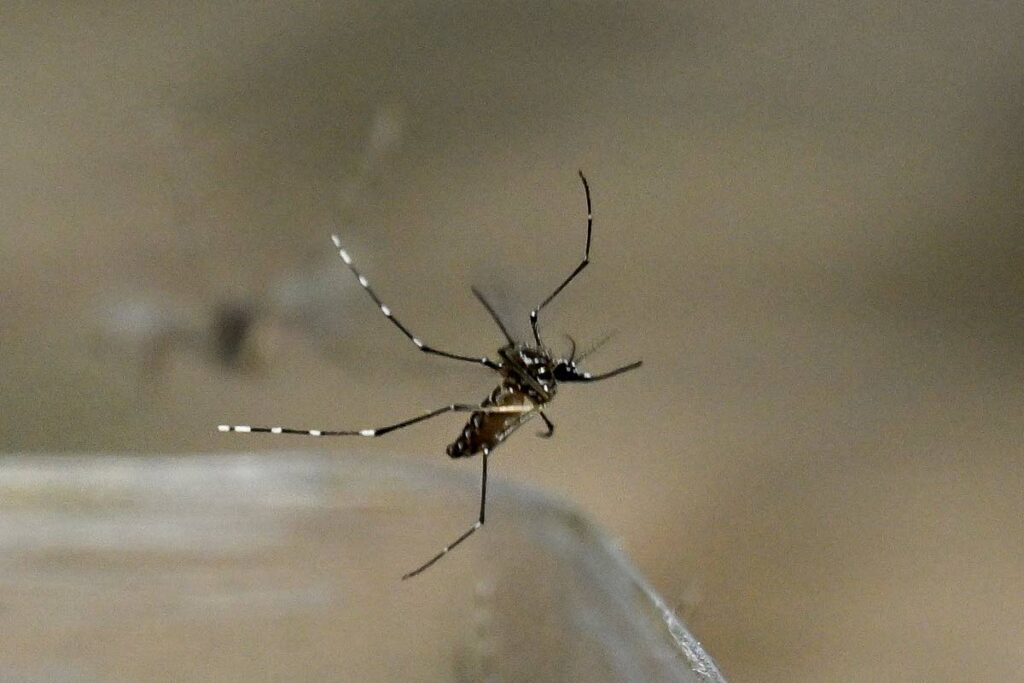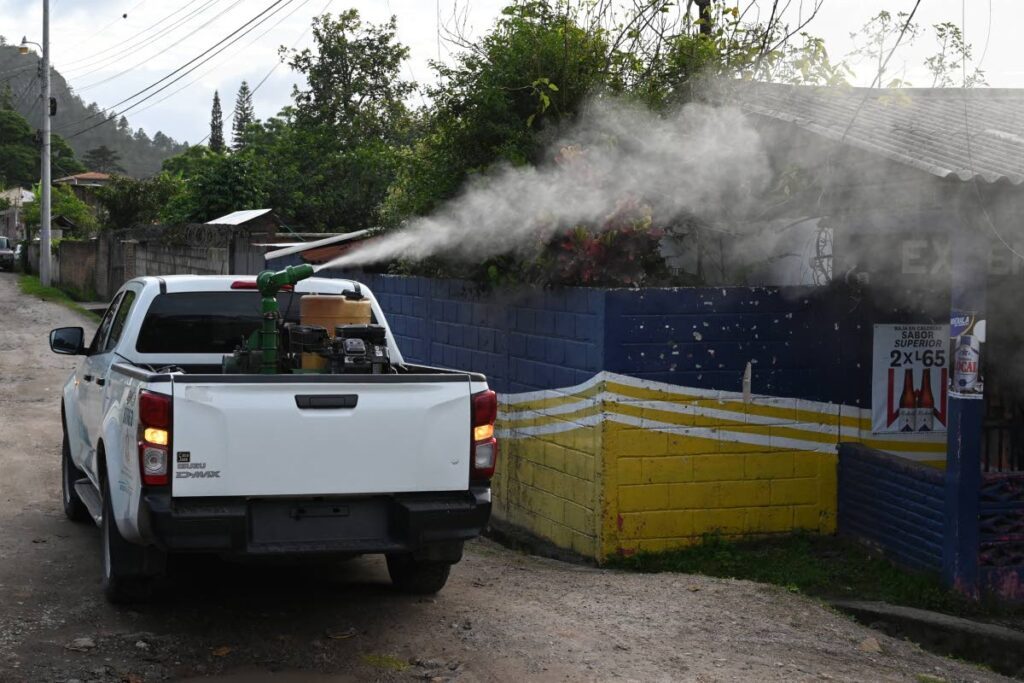Narissa Fraser
As dengue fever cases in Trinidad and Tobago rise, leading to two deaths, survivors are urging the public to take all mosquito-borne diseases seriously.
The Ministry of Health has so far reported two dengue-related deaths and more than 200 cases.
Additionally, the Caribbean Public Health Agency (Carpha) announced a 200-fold increase in dengue cases in the region.
Mosquito-borne diseases, viruses and viral infections could have a major impact on the region’s way of life and tourism industry, it said.
Symptoms of dengue fever include high fever, headache, joint and muscle pain, pain behind the eyes, nausea and vomiting.
Survivors recall the horror
Priya Gunness, 43, of Point Fortin, contracted dengue fever when she was 30. She told Newsday that at first she didn’t know what was wrong with her – she felt extremely tired, had a very high fever and was in “terrible pain”.
“I couldn’t walk and had to sit on the floor to shower. I had to sit on the floor to put toothpaste on my toothbrush and brush my teeth. My hair was as dry as straw and my whole chest was red. Then a friend came to see me and took me to the doctor.”
She was prescribed paracetamol to dull the pain, but she says it didn’t do much.
“My legs, knees, joints – it was so painful. Dengue fever is probably one of the top two most painful experiences of my life.”
With bugs now on the rise, she said she uses things like bug spray and bug mats around the house because she “doesn’t want to take any chances.”
And to those who are not worried about catching the disease, she said: “Dengue fever changes your life forever. Once you experience it, it’s like fasting outside the gates of hell. It really pushes your body to its limits and you worry you’re going to die… You become so weak, even drinking water becomes difficult. Even if adults aren’t worried, I can’t imagine a child catching dengue fever.”
Debbie Jacob, 70, a Newsday columnist who lives in St. Ann’s, said she contracted dengue fever at age 45 and the pain was so unbearable she would rather die than suffer any longer.

“I went to the doctor because I was really sick and he said, ‘You don’t need to do a test, you know it’s dengue fever’.”
But, she added, it showed up in subsequent blood test results.
“I’ve never felt like this before. Living terror. It’s awful!”
“I had a friend over at the time because my kids were around nine and 10 and I couldn’t look after them. I was totally unconscious. She said I was hallucinating… It felt like another layer of my body had been penetrated, I had trouble eating and drinking and I had terrible headaches that made my eyes pop out of my head.”
She, too, said the medication did not ease the pain.
“I want to die”
When asked if there was a moment when he felt he wouldn’t survive, Jacob said: “The truth is, my daughter got it too. I said to myself, ‘I feel like I’m going to die and I hope so,’ and she said it out loud.”
“It’s so horrible. I just want to die because I don’t want to feel any more pain.”
“It feels like my bones are literally being crushed. It doesn’t feel like muscle pain, it feels like someone is crushing my bones. I can’t sleep.”
She said the recovery process was extremely long, and after six months she felt like “all my teeth had fallen out.”

“I was so scared that I immediately made an appointment with the dentist. The dentist took one look at me and said, ‘Oh, you’ve definitely had dengue fever within the last few months. You have a virus in your mouth that can only be found in people who have had dengue fever.'”
She was told this was extremely rare and that she would have to undergo gum reconstruction surgery.
“For me, COVID-19 has never been easy, but dengue fever was a thousand times worse.”
Another woman, 43, from Santa Cruz, who asked not to be named, said she had the disease twice in her 20s and it was “an experience I’ll never forget.”
“It felt like my skull had split open. The pain behind my eyes was terrible…”
The second time around, he had to have regular blood tests to make sure he wasn’t bleeding, and the World Health Organisation (WHO) has said people infected a second time are at higher risk of developing “severe dengue”.
Symptoms of severe dengue include bleeding gums and nose, blood in the vomit or stool, pale skin, and rapid breathing.
“At one point, I was like, ‘OK, Lord, just take me.’
Learning about the rising number of cases locally, she said she feels both scared and wary.
“Please don’t take this lightly. This is a serious matter. I wouldn’t want anyone to have to go through that.”
A Jamaican man, who also asked not to be named, said that after his “very painful” experience, he is now urging his friends to take all necessary precautions to prevent mosquito breeding.
Now 24, he says he was diagnosed with the disease when he was 18. He said he was trying to sleep at night but found it difficult to fall asleep.

“Then I gradually started to feel pain, especially in my stomach area. At first I thought it was just a normal stomach ache, but the pain got stronger and stronger.”
He then vomited and had diarrhea.
“Eventually, I managed to settle into a comfortable position and sleep for an hour at a time.
“They tried to take me to hospital but it hurt to move and even someone touching me hurt.”
He was admitted to hospital after blood tests revealed he had dengue fever and his white blood cell count was also found to be extremely low.
“My eyes were red and I was told my capillaries were leaking water.”
He was put on a special diet because of his low white blood cell count, couldn’t eat leafy vegetables that boost iron levels, couldn’t eat anything with bones because doctors feared his cuts would cause internal bleeding, and staff caring for him had to wear protective gear, but only to protect him, not the other way around.
“I just felt pain.”
Two people died of dengue fever during their stay, he said, and at one point a news report of another dengue-related death came on the television, which staff frantically turned off.
Zika virus resurges in CARICOM
Kalfa said it had recently received reports of confirmed cases of Zika and Chikungunya infections at its medical microbiology laboratory.
Symptoms of the Zika virus, which is also spread by mosquitoes, include a rash, fever, conjunctivitis, and muscle and joint pain.
Chikungunya, on the other hand, causes severe joint pain and fever.
A Zika survivor from Petit Valley said she developed a terrible rash and felt extremely fatigued.
“My bones hurt. I couldn’t move, I couldn’t eat, I couldn’t get up, I didn’t want to go to the bathroom…”
She became severely dehydrated and had to go to hospital to get an IV drip.
She said cases were on the rise at the time, so she took some precautions around her home.
“There was a moment between the first time I went to hospital and the second time I went there where I felt really sick. All the lights outside were out, only the street lights were on, and I said, ‘This is so awful that this is going to be my last view’.
“When I turn over in bed, I feel like my body is on fire, like someone is snapping me in half, and I feel like I can’t do anything.”
But she is not surprised by the recent increase in mosquito-borne diseases across CARICOM countries.
“People don’t seem to think it’s anything serious. I feel like there’s a public opinion that, ‘It’s just dengue, Zika or chikungunya,’ but you’re completely disabled for days or weeks and in constant pain. No medication makes the pain go away.”
“Hopefully people will start taking this seriously and thinking about others and not just themselves. Otherwise we’ll all be in a bad situation.”
A chikungunya survivor from Point Fortin said he was very weak, had a fever and his symptoms “came on out of nowhere”.
“I said (I’m going to sleep for a while), but when I got up and tried to walk, my joints hurt. I almost fell down the stairs.”
“After that it just got worse. I started to feel nauseous and the back of my head became swollen and very painful.”
prevention:
To lower the chance of spreading mosquito-borne diseases, Carpha suggests:
Check for and remove standing water around your home
Keep your home and community areas clean and free of materials and containers that can collect water.
Install wire mesh or screens on doors and windows to prevent mosquitoes from entering your home.
• Water storage drums and tanks should be properly covered and regularly inspected to ensure no breeding occurs.
● Roof gutters should also be cleaned to prevent water from pooling.
=


